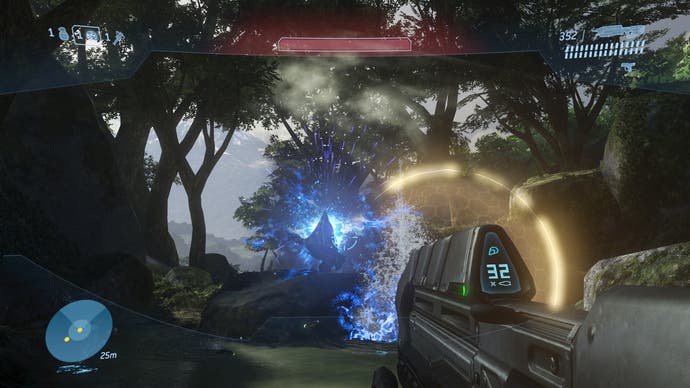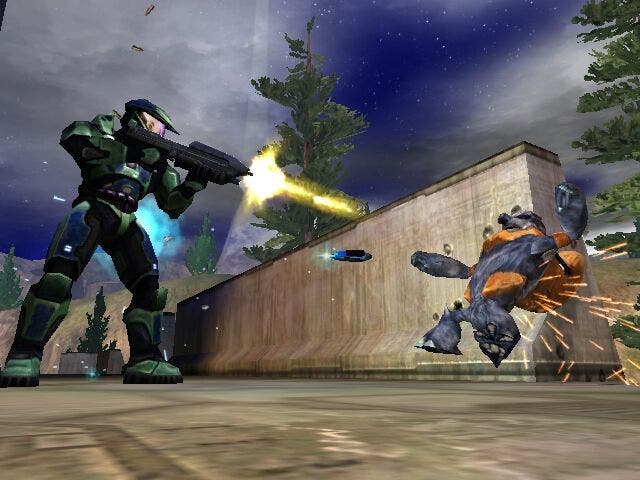Bungie's Damian Isla
Bungie's AI guru on the thinking behind Halo.
Most big, modern games are, of necessity, a team effort - so much so that it's often hard to ascribe any particular part of the experience to one person. In the Halo series, for instance, all manner of people contributed to the games, and for the most part, you'd be hard pressed to pick out a great moment and say, "this person made this". It's a team effort. Everyone's fingers are in all sorts of pies, and every pie has all sorts of fingers in it.
Scattered throughout your experience of the Master Chief's story, however, there are a few moments that Damian Isla could probably claim as his own. As Bungie's AI code guru, he's responsible for those perfect meetings of gameplay and enemy behaviour.
This summer, Damian was in Brighton to talk to the Develop conference about how Halo's AI works - and how the "foundational ideas" that describe the behaviour and reactions of enemies have evolved over time, taking in lessons learned and technology advances from Halo 1 right the way through to last year's Halo 3. We caught up with him for a chat about Halo's digital brain - and, although Bungie's next project remains under wraps, a quick look into where the team's AI guru sees the future of his craft.
It's much more the latter. It's definitely gameplay ideas - things like, AI is about territory. The game playing of an AI is a game of territory, ultimately. It's things like how we go about creating satisfying enemies, satisfying AI, and the various ideas that went into that. AIs with limited knowledge models, so that for instance they can't track you when you run behind a wall.

Then you have AIs that can make mistakes - for us, that turned out to be a very interesting and important foundational idea, one that we've stayed with for years and years. All of these ideas are very much about player experience, and creating gameplay. They're very external. The algorithms under the hood have in fact completely changed, in many ways - but the design cores have always remained the same. I think that speaks to the success and strength of those ideas in the first place.
Yeah, they are ideals, ultimately. What we've been doing over the course of the trilogy is exploring more and more aspects of those ideas. To take an example, the idea of the limited knowledge model. What that means is that when I go behind a wall, the AI doesn't know where I am after that.
But then, over the course of Halo 3, we explored what that means when you have a group of characters. How do they exchange information about what they know? How do they talk about what they know, and make that intelligible to the player?
You're never done with implementing one of those ideals. There are always more aspects to think about, to implement.
Urgh.

Maybe, yeah. In fact, we've done a lot of talking with the Ensemble guys, and we're all really excited about Halo Wars, because from everything we've seen so far it's a very cool, faithful adaptation.
I'm not sure that it's really that interesting to have the behaviour be the same, of those things. It's just a different scale of engagement - the individual characters don't need to pop in and out of cover in quite the way that they do when you're fighting them first-hand.
I think there are some high-level transitions between infantry and vehicle encounters, that kind of thing. I think that's something that's important at a very high level to the Halo first-person shooters, so it's encouraging to see that as they've developed this RTS, they've really understood what things Halo is known for, and how to translate them into that larger scope of gameplay.
Everything we've seen has been very, very encouraging, so we're very excited about it. And of course, it's also getting right the basics, the general roles - even fictionally. What role do grunts play in the Covenant fighting forces, what role do the Elites play, what role do Warthogs play, what role do Spartans play... All this kind of thing. I think they really nailed that. It's encouraging.

A good deal of it is very specifically designed in. The nucleus of most of that stuff was all in Halo 1, and a lot of that stuff was very specifically designed with an eye towards what would read to the player - what would be enjoyable to the player. We wanted to find little behavioural roles that we could teach the player, about how AIs react to certain things.
A lot of that stuff is not actually that emergent; it's very specifically designed. What's more emergent is some of the gameplay experiences that you have, where you just get a sequence of events or a particular fight that ends up being memorable because of happenstance. The timing of that grenade, that happened to coincide with a shield going down, and a crate that went this way and hit this other guy...
That kind of thing. These sort of chain reactions just come with a fairly dense simulation, AI and physics and damage simulation all packed into a tight space. Something's going to happen, and it's almost always going to be interesting. It adds replayability, of course, because it's all so unpredictable!








